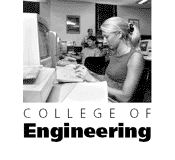| Navigation
got you confused? Try our SITE MAP. Technical problems? Email our webmaster. |
 Click
here to return to the College of Engineering Contents page.
Click
here to return to the College of Engineering Contents page.
Civil Engineering
Holmes 383
2540 Dole Street
Honolulu, HI 96822
Tel: (808) 956-7550
Fax: (808) 956-5014
Web: www.eng.hawaii.edu/CE
Faculty
* Graduate Faculty
- *E. D. H. Cheng, PhD (Chair)--hydrology, hydraulics
- R. Akiona, MS--construction management
- *R. W. Babcock, PhD--environmental engineering
- *H. Brandes, PhD--geotechnical engineering
- W. F. Chen, PhD--structural engineering
- *Y. S. Fok, PhD--hydrology, water resources system analysis
- *R. A. Grace, PhD--hydrology, hydraulics
- *C. C. K. Liu, PhD--hydrology, environmental and systems engineering
- *C. Newtson, PhD--structures
- *P. G. Nicholson, PhD--geotechnical engineering
- *P. Ooi, PhD--geotechnical engineering
- *C. S. Papacostas, PhD--transportation, systems engineering
- *P. D. Prevedouros, PhD--transportation engineering
- *C. Ray, PhD--groundwater hydrology
- *H. R. Riggs, PhD--structures, numerical methods
- *I. N. Robertson, PhD--structures
- *A. Singh, PhD--construction management
- *G. T. Taoka, PhD--applied mechanics
- *M. H. Teng, PhD--hydraulics
Degrees Offered: BS in civil engineering, MS in civil engineering, PhD in civil engineering
The Academic Program
Civil engineering (CE) is concerned with the activities of people and the environment. The civil engineer conceives, plans, designs, constructs, operates, and maintains the physical works necessary for the environmental needs of people. Students who enter civil engineering today can look forward to one of the most rewarding careers open to men and women-rewarding in personal fulfillment, enduring service to humankind, and financial reward. The curriculum is uniquely designed to meet the demands of business, industry, and government where a broad, fundamental education is required.
Undergraduate Study
Bachelor's Degree
The BS degree requires completion of at least 124 credit hours of course work, the equivalent of four years of full-time work. These requirements include 61 credit hours of civil engineering courses from the following areas: applied mechanics, structural analysis and design, hydraulics, surveying, transportation, construction, soil mechanics, hydrology, water resources, and environmental engineering. There are additional required courses in mathematics, physics, and chemistry, as well as courses required by the University in humanities, social sciences, and foreign or Hawaiian language. The curriculum provides a broad-based background of fundamentals with coverage of the humanities and social sciences, basic sciences, mathematics, and the engineering design method. Course enrollment for all CE majors is subject to the approval of an adviser. The requirements are described below and reflected on the check sheet and the list of course prerequisites.
All electives are subject to the approval of an adviser.
College Requirements
Students must complete the General Education Core courses for engineering (see "Undergraduate Programs" within the College of Engineering).
Departmental Requirements
Students must complete the following courses as well as one course in engineering math, one non-CE engineering course, and one biological science elective (specific options are provided on the curriculum check sheet):
- CE 123 Computer Aided Design and Drafting (1)
- CE 211/211L Surveying I and Lab (2/1)
- CE 270 Applied Mechanics I (3)
- CE 271 Applied Mechanics II (3)
- CE 305 Applied Probability and Statistics (3)
- CE 320 Fluid Mechanics Fundamentals (4)
- CE 330 Environmental Engineering (3)
- CE 350 Geotechnical Engineering (4)
- CE 361 Fundamentals of Transportation (3)
- CE 370/370L Mechanics of Materials and Lab (3/1)
- CE 375 Construction Materials (3)
- CE 381 Structural Analysis (3)
- CE 421 Engineering Hydraulics (3)
- CE 431 Water and Wastewater Engineering (3)
- CE 450 Soils and Foundation Engineering (3) or CE 451 Soil and Site Improvement (3)
- CE 462 Traffic Engineering (3) or CE 464 Urban and Regional Transportation Planning (3)
- CE 472 Construction Management (3)
- CE 485 Reinforced Concrete Design (3)
Other important requirements:
- C grade or better is required for CE 270 and CE 271.
- All CE courses must be passed in two attempts.
Graduate Study
Master's Degree
The department offers a graduate program leading to the MS degree in civil engineering with several areas of concentration under Plan A (thesis) or Plan B (non-thesis). Close cooperation is maintained with other departments and the Water Resources Research Center. Details and requirements of each program may be obtained from the department office.
Applicants must present a BS in civil engineering or the equivalent and must submit either the EIT (Engineer-in-Training) exam or the results of the GRE General Test; the GRE subject test (engineering, mathematics, or physics) is recommended. If so required by the Graduate Division, applicants must supply the TOEFL score.
Requirements
Plan A requires a minimum of 30 credit hours, exclusive of seminars. Plan A includes 9 credit hours of thesis research and a minimum of 12 credit hours in graduate civil engineering courses, exclusive of thesis, seminar, and directed reading. Plan B requires a minimum of 38 credits including a minimum of 18 credit hours of graduate civil engineering courses, exclusive of seminar and directed reading, as well as a technical report. Both plans require a minimum of 2 credits of seminar.
Doctoral Degree
Applicants to the PhD program must have fulfilled the requirements for the MS in civil engineering at the University of Hawai'i or its equivalent. Those who have earned the MS at universities other than the University of Hawai'i must furnish the results of the GRE General Test. All applicants must furnish official transcripts of all previous undergraduate and graduate studies and three letters of reference clearly indicating that they are capable of completing a rigorous PhD program. Applicants must also supply a letter explaining in detail their career goals, specific area of concentration, work experience, and reasons for applying to the program. If so required by the Graduate Division, applicants must supply the TOEFL score.
Requirements
Candidates for a PhD are required to pass a qualifying examination consisting of oral and written components. The examination will be confined to basic topics in civil engineering. One purpose of the qualifying examination is to identify possible deficiencies in the student's background with a view toward remedial measures. In addition, the examination will serve as a means of assessing the student's potential for doctoral studies.
In order to earn a PhD in civil engineering, a student must satisfactorily complete a minimum of 50 credit hours in course work beyond the BS and a minimum of 2 credit hours in civil engineering graduate seminar. Students must also complete and successfully defend a satisfactory doctoral dissertation. Based on a written recommendation of the student's dissertation committee and with the approval of the chair of graduate studies in civil engineering, students entering the PhD program may be granted an equivalence of up to 30 credit hours earned as part of the student's master's program. The 30-credit-hour equivalents may include up to 9 credit hours for the previous MS thesis work but exclude graduate seminar credit hours taken as part of the MS program.
The courses that a student undertakes in order to fulfill the PhD-credit-hour requirements must be selected by the student and approved by the student's dissertation committee. At least 24 credit hours must be from graduate-level civil engineering courses. The remaining courses may include graduate and advanced undergraduate courses offered by the civil engineering department or other appropriate departments of the University.
Comprehensive Examination
Every PhD student must pass a comprehensive examination. The purpose of this examination is to ascertain the student's comprehension of the advances in the chosen specialty. Examinations are given when, in the judgment of the dissertation committee, the student has had sufficient preparation, but not sooner than six calendar months after the student has passed the qualifying examination.
Students pass the examination upon favorable recommendation of the majority of the dissertation committee. Students who fail may, at the discretion of the graduate faculty, repeat the test once at least six months later. Students who fail the examination a second time are dropped from the program.
Students attain the status of doctoral candidate only after passing the comprehensive examination and submitting a dissertation proposal that receives the unanimous approval of the dissertation committee.
Final Examination
PhD candidates are required to take a final oral examination in defense of their dissertation. The examination is conducted by the candidate's dissertation committee. Students pass upon the favorable recommendation of the majority of the committee.
NEXT: Electrical Engineering >>
Click here to return to the College of
Engineering Contents page.
